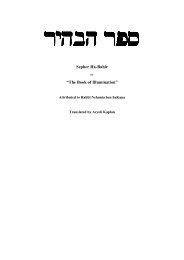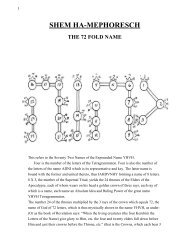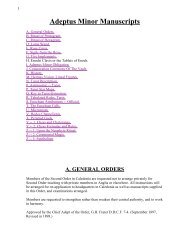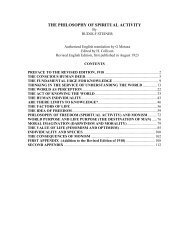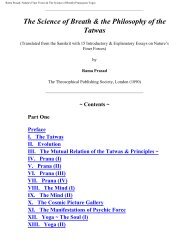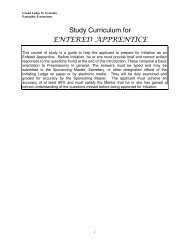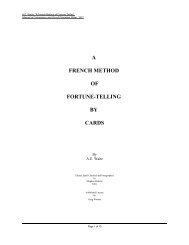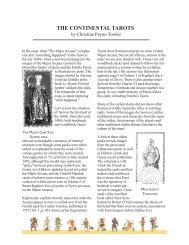Band 2 Anthropogenesis - H.P. Blavatsky
Band 2 Anthropogenesis - H.P. Blavatsky
Band 2 Anthropogenesis - H.P. Blavatsky
You also want an ePaper? Increase the reach of your titles
YUMPU automatically turns print PDFs into web optimized ePapers that Google loves.
"This process, such as it is minutely described in the Vedic Sutras, consists in rapidly turning a stick in a socket made in<br />
the centre of a piece of wood. The friction develops intense heat and ends by setting on fire the particles of wood in<br />
contact. The motion of the stick is not a continuous rotation, but a series of motions in contrary senses, by means of a<br />
cord fixed to the stick in its middle: the operator holds one of the ends in each hand and pulls them alternately. . . . The<br />
full process is designated in Sanskrit by the verb manthami, mathnani; which means 'to rub, agitate, shake and obtain by<br />
rubbing,' and is especially applied to rotatory friction, as proved by its derivation from mandala, which signifies a circle. . .<br />
. The pieces of wood serving for the production of fire have each their name in Sanskrit. The stick which turns is called<br />
pramantha; the discus which receives it is called arani and aranî: "the two aranis" designating the ensemble of the<br />
instrument" (p. 358 et seq.).***<br />
It remains to be seen what the Brahmins will say to this. But supposing Prometheus has been conceived in one of the<br />
aspects of his<br />
[[Footnote(s)]] -------------------------------------------------<br />
* The modern attempt of some Greek scholars (poor and pseudo scholars, they would have appeared in the day of the<br />
old Greek writers!) to explain the real meaning of the ideas of AEschylus, which, being an ignorant ancient Greek, he<br />
could not express so well himself, is absurdly ludicrous!<br />
** See also his Memoires de la Societe de la Linguistique following the "Fire Myths," (Vol. I, p. 337, et seq.)<br />
*** There is the upper and nether piece of timber used to produce this sacred fire by attrition at sacrifices, and it is the<br />
aranî which contains the socket. This is proven by an allegory in the Vayu Purana and others, which tell us that Nemi, the<br />
son of Ikshwaku, had left no successor, and that the Rishis, fearing to leave the earth without a ruler, introduced the<br />
king's body into the socket of an aranî -- like an upper aranî -- and produced from it a prince named Janaka. "It was by<br />
reason of the peculiar way in which he was engendered that he was called Janaka." (But see Goldstucker's Sanskrit<br />
Dictionary at the word Arani.) Devaki, Krishna's mother, in prayer addressed to her, is called "the aranî whose attrition<br />
engenders fire."<br />
------------------------------------------------------------------------<br />
[[Vol. 2, Page]] 525 GREEK IDEAS MISUNDERSTOOD.<br />
myth as the producer of fire by means of pramantha, or as an animate and divine pramantha, would this imply that the<br />
symbolism had no other than the phallic meaning attributed to it by the modern symbologists? Decharme, at any rate,<br />
seems to have a correct glimmering of the truth; for he unconsciously corroborates by his remarks all that the Occult<br />
sciences teach with regard to the Manasa Devas, who have endowed man with the consciousness of his immortal soul:<br />
that consciousness which hinders man "from foreseeing death," and makes him know he is immortal.* "How has<br />
Prometheus got into the possession of the (divine) spark?" he asks. "Fire having its abode in heaven, it is there he must<br />
have gone to find it before he could carry it down to men, and, to approach the gods, he must have been a god himself."<br />
The Greeks held that he was of the divine race; the Hindus, that he was a Deva. Hence "with the Greeks he was the son<br />
of the Titan lapetos," [[Iapetonides]] (Theog. 528) . . . . "But celestial fire belonged in the beginning to the gods alone; it<br />
was a treasure they reserved for themselves . . . over which they jealously watched . . . 'The prudent son of Iapetus,' says<br />
Hesiod, 'deceived Jupiter by stealing and concealing in the cavity of a narthex, the indefatigable fire of the resplendent<br />
glow' (Theog. 565) . . . Thus the gift made by Prometheus to men was a conquest made from heaven. . . " "Now<br />
according to Greek ideas," (identical in this with those of the Occultists) "this possession forced from Jupiter, this human<br />
trespassing upon the property of the gods, had to be followed by an expiation. . . . Prometheus, moreover, belongs to that<br />
race of Titans who had rebelled** against the gods, and whom the master of Olympus had hurled down into Tartarus; like<br />
them, he is the genius of Evil, doomed to cruel suffering, etc., etc."<br />
That which is revolting in the explanations that follow, is the one-sided view taken of this grandest of all the myths. The<br />
most intuitional among modern writers cannot or will not rise in their conceptions above the level of the Earth and Cosmic<br />
phenomena. It is not denied that the moral idea in the myth, as presented in the Theogony of Hesiod, plays a certain part<br />
in the primitive Greek conception. The Titan is more than a thief of the celestial fire. He is the representation of humanity -<br />
- active, industrious, intelligent, but at the same time ambitious, which aims at equalling divine powers. Therefore it is<br />
humanity punished in the person of Prometheus, but it is only so with the Greeks. With the latter, Prometheus is not a<br />
[[Footnote(s)]] -------------------------------------------------<br />
* The monad of the animal is as immortal as that of man, yet the brute knows nothing of this; it lives an animal life of<br />
sensation just as the first human would have lived, when attaining physical development in the Third Race, had it not<br />
been for the Agnishwatta and the Manasa Pitris.<br />
** The fallen angels, therefore; the Asuras of the Indian Pantheon.<br />
------------------------------------------------------------------------<br />
[[Vol. 2, Page]] 526 THE SECRET DOCTRINE.<br />
criminal, save in the eyes of the gods. In his relation with the Earth, he is, on the contrary, a god himself, a friend of<br />
mankind ([[philanthropos]]), which he has raised to civilization and initiated into the knowledge of all the arts; a conception<br />
which found its most poetical expounder in AEschylus. But with all other nations Prometheus is -- what? The fallen Angel,<br />
Satan, as the Church would have it? Not at all. He is simply the image of the pernicious and dreaded effects of lightning.<br />
He is the "evil fire" (mal feu) and the symbol of the divine reproductive male organ. "Reduced to its simple expression, the<br />
myth we are trying to explain is then simply a (Cosmic) genius of fire" (p. 261). It is the former idea (the phallic) which was<br />
pre-eminently Aryan, if we believe Ad. Kuhn (in his Herabkunft des Feuers und des Gottertranks) and Baudry. For --<br />
"The fire used by man being the result of the action of pramantha in the arani, the Aryas must have ascribed (?) the same<br />
origin to celestial fire, and they must* have imagined (?) that a god armed with pramantha, or a divine pramantha,




